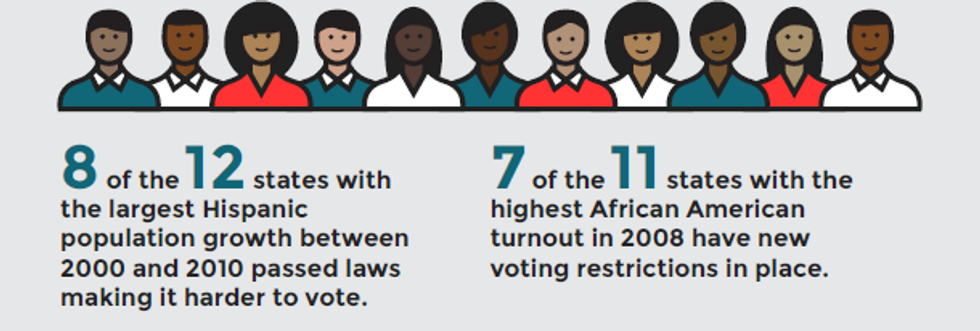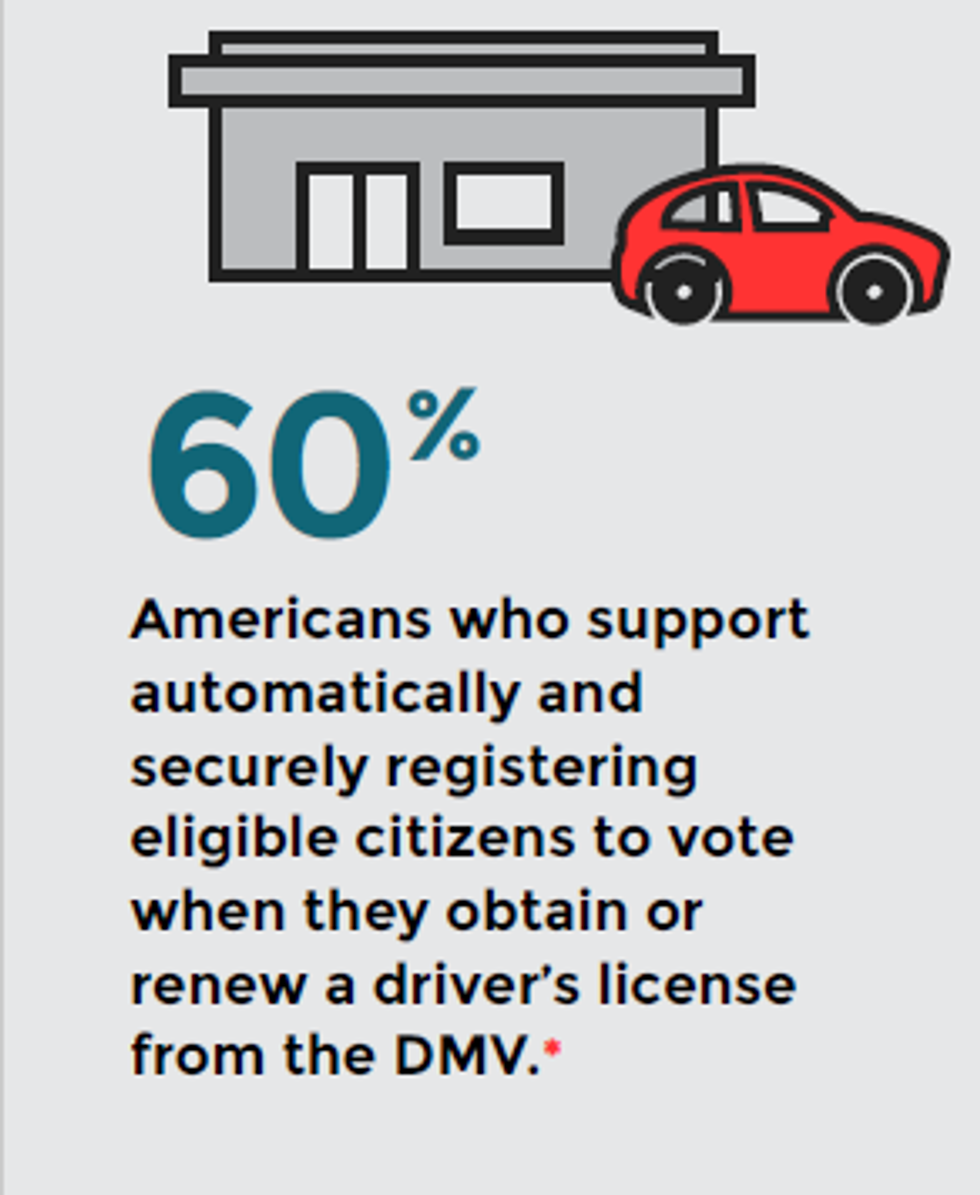

SUBSCRIBE TO OUR FREE NEWSLETTER
Daily news & progressive opinion—funded by the people, not the corporations—delivered straight to your inbox.
5
#000000
#FFFFFF
To donate by check, phone, or other method, see our More Ways to Give page.


Daily news & progressive opinion—funded by the people, not the corporations—delivered straight to your inbox.
This year is one of the most important elections in recent history. More than 100 million Americans will cast a ballot in November. Yet many voters continue to face obstacles to the ballot box.
In 2016, 16 states have restrictive voting rules in place for the first time in a presidential election. This is part of the biggest voting rights rollback since the Jim Crow era.
The primaries have already seen higher-than-average turnout -- and real voting problems in places like Arizona. But the real concern is how many could be impacted in November.
That's because these restrictions are more likely to affect minorities, lower-income voters, students, and the elderly -- who are more likely to vote in high-turnout races, like in November.
To make matters worse, states with higher African American turnout and larger Hispanic population growth were more likely to pass voting restrictions in the first place. Many of these restrictions were implemented after the Supreme Court gutted the Voting Rights Act in 2013, which previously required certain jurisdictions to gain prior approval before changing voting rules that could affect minorities.

Instead of making it harder to vote, we should ensure every eligible American is able to cast a ballot that counts this November.
Along with craigconnects, we polled 1,006 adults about their perception of voting in America. We found some surprising statistics -- most importantly, that 69 percent want to see voting reforms.
By automatically and securely registering every eligible citizen, the United States could add up to 50 million new voters nationwide, increase the accuracy of our rolls, cut costs, and curb the potential for fraud.

Legislators on both sides of the aisle have supported automatic registration bills, and 60 percent of Americans support the proposal.
Here's how it works: When eligible voters interact with the DMV, they are automatically and securely added to the voter rolls.
Every voter would be given a chance to opt out (no one would be registered against their will). Since Oregon implemented automatic registration earlier this year, their voter registration rate has quadrupled.
You can join us and tell Congress it's time for automatic registration nationwide.

By modernizing our voting system, we can ensure that our democracy works the way our Founders intended -- an equal vote, and voice, for every citizen.
Dear Common Dreams reader, The U.S. is on a fast track to authoritarianism like nothing I've ever seen. Meanwhile, corporate news outlets are utterly capitulating to Trump, twisting their coverage to avoid drawing his ire while lining up to stuff cash in his pockets. That's why I believe that Common Dreams is doing the best and most consequential reporting that we've ever done. Our small but mighty team is a progressive reporting powerhouse, covering the news every day that the corporate media never will. Our mission has always been simple: To inform. To inspire. And to ignite change for the common good. Now here's the key piece that I want all our readers to understand: None of this would be possible without your financial support. That's not just some fundraising cliche. It's the absolute and literal truth. We don't accept corporate advertising and never will. We don't have a paywall because we don't think people should be blocked from critical news based on their ability to pay. Everything we do is funded by the donations of readers like you. Will you donate now to help power the nonprofit, independent reporting of Common Dreams? Thank you for being a vital member of our community. Together, we can keep independent journalism alive when it’s needed most. - Craig Brown, Co-founder |
This year is one of the most important elections in recent history. More than 100 million Americans will cast a ballot in November. Yet many voters continue to face obstacles to the ballot box.
In 2016, 16 states have restrictive voting rules in place for the first time in a presidential election. This is part of the biggest voting rights rollback since the Jim Crow era.
The primaries have already seen higher-than-average turnout -- and real voting problems in places like Arizona. But the real concern is how many could be impacted in November.
That's because these restrictions are more likely to affect minorities, lower-income voters, students, and the elderly -- who are more likely to vote in high-turnout races, like in November.
To make matters worse, states with higher African American turnout and larger Hispanic population growth were more likely to pass voting restrictions in the first place. Many of these restrictions were implemented after the Supreme Court gutted the Voting Rights Act in 2013, which previously required certain jurisdictions to gain prior approval before changing voting rules that could affect minorities.

Instead of making it harder to vote, we should ensure every eligible American is able to cast a ballot that counts this November.
Along with craigconnects, we polled 1,006 adults about their perception of voting in America. We found some surprising statistics -- most importantly, that 69 percent want to see voting reforms.
By automatically and securely registering every eligible citizen, the United States could add up to 50 million new voters nationwide, increase the accuracy of our rolls, cut costs, and curb the potential for fraud.

Legislators on both sides of the aisle have supported automatic registration bills, and 60 percent of Americans support the proposal.
Here's how it works: When eligible voters interact with the DMV, they are automatically and securely added to the voter rolls.
Every voter would be given a chance to opt out (no one would be registered against their will). Since Oregon implemented automatic registration earlier this year, their voter registration rate has quadrupled.
You can join us and tell Congress it's time for automatic registration nationwide.

By modernizing our voting system, we can ensure that our democracy works the way our Founders intended -- an equal vote, and voice, for every citizen.
This year is one of the most important elections in recent history. More than 100 million Americans will cast a ballot in November. Yet many voters continue to face obstacles to the ballot box.
In 2016, 16 states have restrictive voting rules in place for the first time in a presidential election. This is part of the biggest voting rights rollback since the Jim Crow era.
The primaries have already seen higher-than-average turnout -- and real voting problems in places like Arizona. But the real concern is how many could be impacted in November.
That's because these restrictions are more likely to affect minorities, lower-income voters, students, and the elderly -- who are more likely to vote in high-turnout races, like in November.
To make matters worse, states with higher African American turnout and larger Hispanic population growth were more likely to pass voting restrictions in the first place. Many of these restrictions were implemented after the Supreme Court gutted the Voting Rights Act in 2013, which previously required certain jurisdictions to gain prior approval before changing voting rules that could affect minorities.

Instead of making it harder to vote, we should ensure every eligible American is able to cast a ballot that counts this November.
Along with craigconnects, we polled 1,006 adults about their perception of voting in America. We found some surprising statistics -- most importantly, that 69 percent want to see voting reforms.
By automatically and securely registering every eligible citizen, the United States could add up to 50 million new voters nationwide, increase the accuracy of our rolls, cut costs, and curb the potential for fraud.

Legislators on both sides of the aisle have supported automatic registration bills, and 60 percent of Americans support the proposal.
Here's how it works: When eligible voters interact with the DMV, they are automatically and securely added to the voter rolls.
Every voter would be given a chance to opt out (no one would be registered against their will). Since Oregon implemented automatic registration earlier this year, their voter registration rate has quadrupled.
You can join us and tell Congress it's time for automatic registration nationwide.

By modernizing our voting system, we can ensure that our democracy works the way our Founders intended -- an equal vote, and voice, for every citizen.